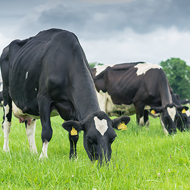
Study assesses cows' emotional state when housed indoors full-time.
New research led by Queen’s University Belfast has found that dairy cows' emotional wellbeing may be damaged by being kept indoors full-time.
The study aimed to assess whether cows possess the same 'judgment bias' that humans do – whereby negative moods are more likely to lead to negative judgements about ambiguous cues or situations.
Dr. Gareth Arnott, senior lecturer in Animal Behaviour and Welfare at Queen’s University, explains: “Animal welfare scientists and dairy consumers have long been concerned that depriving dairy cattle of pasture access harms their welfare.
“Pasture access can promote natural behaviour, improve cows’ health, and cows given the choice spend most of their time outside. However, the effects of pasture access on dairy cows’ psychological wellbeing have been poorly understood – that is what our judgement bias study intended to measure.”
The researchers collaborated with the Agri-Food and Biosciences Institute for the study, which has been published in Scientific Reports. The team gave 29 Holstein-Friesian dairy cows 18 days of overnight pasture access and 18 days of full-time indoor housing.
After this, each cow was trained to approach a food rewarded bucket location and to not approach an unrewarded bucket location. Then, to test judgement bias, the researchers presented the cows with buckets in between the trained locations. Cows that approached these buckets demonstrated an 'optimistic' judgement bias – as they expected a reward under ambiguous conditions.
The results showed that cows kept indoors full-time approached the known rewarded bucket location more quickly, suggesting a positive emotional state.
Lead author of the paper Andrew Crump said: “Increased reward anticipation suggests that an animal has fewer rewards in its life, so our results indicate that pasture is a more rewarding environment for dairy cows, which may induce more positive emotional wellbeing than full-time housing.
“We hope that our research encourages farmers, retailers, government and consumers that pasture access is important for cow welfare, and should be protected. In countries where full-time housing is common, we hope that ours and other welfare studies challenge this trend.”



 The Federation of Independent Veterinary Practices (FIVP) has announced a third season of its podcast, Practice Matters.
The Federation of Independent Veterinary Practices (FIVP) has announced a third season of its podcast, Practice Matters.